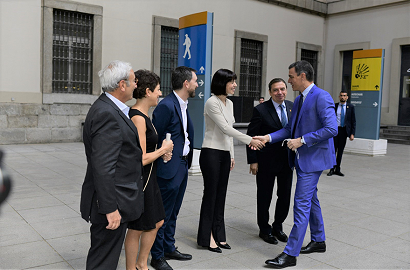Spanish Government boosts agri-food PERTE budget

The EUR 1 billion initially announced will be increased to EUR 1.8 billion in public investment
Prime Minister Pedro Sánchez used his visit to the Spanish Wine Fair (Fenavin), held in Ciudad Real from 10 to 12 May, to publicly present the Strategic Project for Economic Recovery and Transformation (‘PERTE’) for the agri-food industry. He did so in the presence of several ministers, including the Minister of Agriculture, Fisheries and Food, Luis Planas.
Approved by the Council of Ministers on 8 February, the agri-food PERTE will address three cross-cutting processes: the sustainability and competitiveness of the industry; traceability and food safety; and the development of new technologies, services and products to increase the export capacity of agri-food products, as well as digital technologies and services created in Spain.
Healthy, safe and sustainable food
The aim of this plan is to promote the integrated development of the entire agri-food chain through the digitalisation of processes, as well as the incorporation of knowledge and innovation. The plan thereby intends to facilitate access to healthy, safe and sustainable food. It also aims to ensure that the industry meets the needs of an increasingly fragmented population, and one which is increasingly demanding food that is healthy and environmentally friendly.
Now that the plan is being implemented, the main piece of news was the Prime Minister's announcement at Fenavin that the initial budget would be almost doubled. Referring to the EUR 1 billion announced in February, Sánchez explained that public investment will rise to EUR 1.8 billion. This total will in addition be greatly increased thanks to public-private partnership.
Three euros of private investment for every euro of public investment
As Sánchez explained the next day at an event organised by eldiario.es, “The forecast we have for leveraging private investment is also excellent. We are talking about three euros of private investment for every euro of public investment.” In this respect, he affirmed that “There is interest far beyond the public sector in tackling this transformation, this modernisation of an industry that is as socially and economically important as the agribusiness industry.”
At the same event, organised by the online newspaper on 12 May, Luis Planas stated that the agri-food PERTE is, “An excellent instrument for supporting the transformation of production in the agri-food industry and for encouraging sustainable irrigation through digitalisation, in order to become more efficient and profitable.” Convinced that, among other benefits, it will contribute to territorial cohesion, the minister insisted on the need to promote “competitive sustainability”, because, as he explained, “Anything that is not profitable is not sustainable.”
Photo: www.lamoncloa.gob.es




